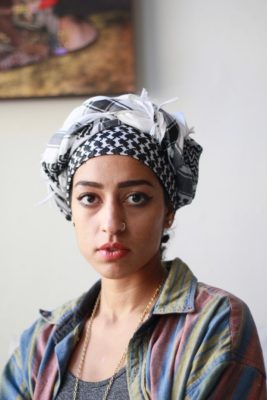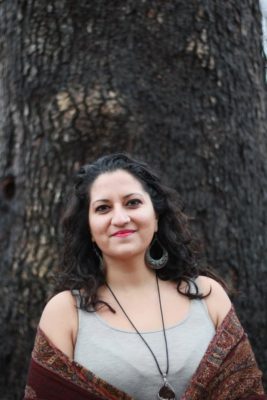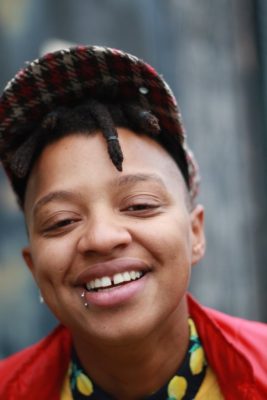
07 Feb Queer Muslim women from the south: ‘We exist and we’re fierce’
Samra Habib
It’s been especially challenging to be a Muslim this past week. While Americans of all creeds and faiths were rallying across the country opposing Trump’s immigration ban on travelers and immigrants from seven Muslim-majority countries, news broke about a mosque shooting in Quebec.
Some of the six worshippers who were killed had moved to Canada from places like Algeria and west Africa for a better life. Although recent events might hint at dark times ahead for millions of American Muslims, the reality is that racism and Islamophobia are nothing new. According to the Center for the Study of Hate and Extremism, the rate of hate crimes against Muslims in the United States rose to 38 per month from 12.6 after the mass shooting in San Bernardino, California.
As part of my ongoing photography project, Just Me and Allah: A Queer Muslim Photo Project, I am asking my subjects to share how Islam shapes their lives in the hope of exploring what it means to be Muslim at this time in history. So this week, I asked three queer Muslim women from Durham, North Carolina to discuss how the new administration is affecting their lives, and how collective resistance is what will move America forward.
Saba (above): ‘I love that I am born and raised in the south’
I think right now, like many folks in America, I am balancing a lot of different feelings. There is fear for what this administration is going to do, and how that will impact me and the people I love.
Our safety, our survival, is routinely threatened in the name of some hypothetical greater safety that does not include us. What they are trying to keep safe is white supremacy, what they are trying to protect is their own power.
I’m scared about hate crimes, about healthcare, about same-sex marriage and reproductive rights being negatively impacted, about voter suppression, Muslim registries, and deportations. It is a really sobering time, seeing how power is operating in this country and how important it is that we get organized so we can take that power.
Right now, there are protests in Durham daily. I’m seeing more and more brand-new folks showing up to protests than ever before. We are coming together to hear directly from those impacted by these racist policies, to speak out in solidarity with them. Folks are calling their representatives and encouraging others to do the same.
I’ve been in North Carolina my entire life. There are a lot of challenges and fears, to be sure, but I love that I am born and raised in the south. As I’ve gotten older, I feel more deeply that this is my state, and that makes me dedicated to stay here and make it better.
Sufia: ‘I am fueled by how we are already coming together’
Although I am worried about the new legislation and executive orders coming down the pipeline, what I am concerned about the most right now is the majority of US folks staying silent in the face of oppression. I’m concerned that the people who could say or do something in a moment when it will matter the most, won’t. Though I feel these concerns, I am also fueled by the ways in which we are already coming together, the dreaming, healing, and creation which is already happening, and I absolutely feel that this most recent version of fascism rearing its head is just the dying gasps of white supremacy.
There is a new level of entitlement that is very concerning to me. I think people have held these racist and oppressive beliefs for generations, they aren’t new, but I do think we are seeing a new wave of emboldened harm being enacted on people’s bodies and lives.
At this point in my life, my Muslim identity is really more of a political one; though so much of who I am has been shaped by the Muslim community and the space for deep questioning that I found within Islam as a young person, my spiritual practice is now earth-based. Moving to Durham and finding other queer Muslim-identified folks has been hugely transformational in my relationship to Islam. I no longer feel that I have to decide between being queer and Muslim. My Muslim identity is inherently queer, because I am.
Islam in its purest form is simply a way of life. From its teachings, I have gathered a deep appreciation and respect for the concept of inner struggle, and believe that this is the work every human needs to do to be healthy. I recognize that my inner struggle is to develop the spiritual strength to be emotionally and spiritually ready to show up against oppression, fascism, racism and to move this outward into my work in solidarity with the health of our planet, and the creatures on it.
Laila: ‘Organizing is a labor of love’
Trump winning the presidency was a disaster. It seemed like all of the work done to progress this country had come to a standstill for a moment. Afterward, my partner Saba (who is also Muslim) and I weighed the consequences of losing healthcare or being denied the right to marry, which could result in not having the legal right to be present in case of a medical incident. I want to be with her until I die, so it was an easy decision to get married before the inauguration. Though we’ve received some criticism, there’s been an overwhelming outpour of affirmations, love and support.
There’s no doubt that this new administration is bringing the truth of white supremacist hetero-patriarchy to the surface for a lot of white folks. The women’s marches were proof of this awakening. It’s long overdue and I’m glad it’s happening.
There are so many small and big ways folks can step up to assert and uplift the dignity and humanity of queer Muslim women of color. From speaking out against Islamophobic attacks or passive-aggression online and IRL, to funding our work, our own platforms, or providing more platforms for us to speak our truths and be seen. We exist and we’re fierce as fuck.
I do a lot of organizing work. Going door-to-door, couch-to-couch, talking to working-class people of color about the economic struggles in our community is amazing and exhausting work. Trying to identify ways to move my people into organizing and taking action is a long haul but it’s a labor of love. There is a deep numbing and hopelessness from generational trauma that black folks have in this country often referred to as post-traumatic slave syndrome (PTSS). Outside of the churches and finding some spiritual healing in this life, I meet so many black folks, especially young people, who struggle with hopelessness and I know that feeling because I experienced that every single day.
The work is hard, necessary and rewarding. Between music and community organizing, I know this is my contribution to changing this world.



